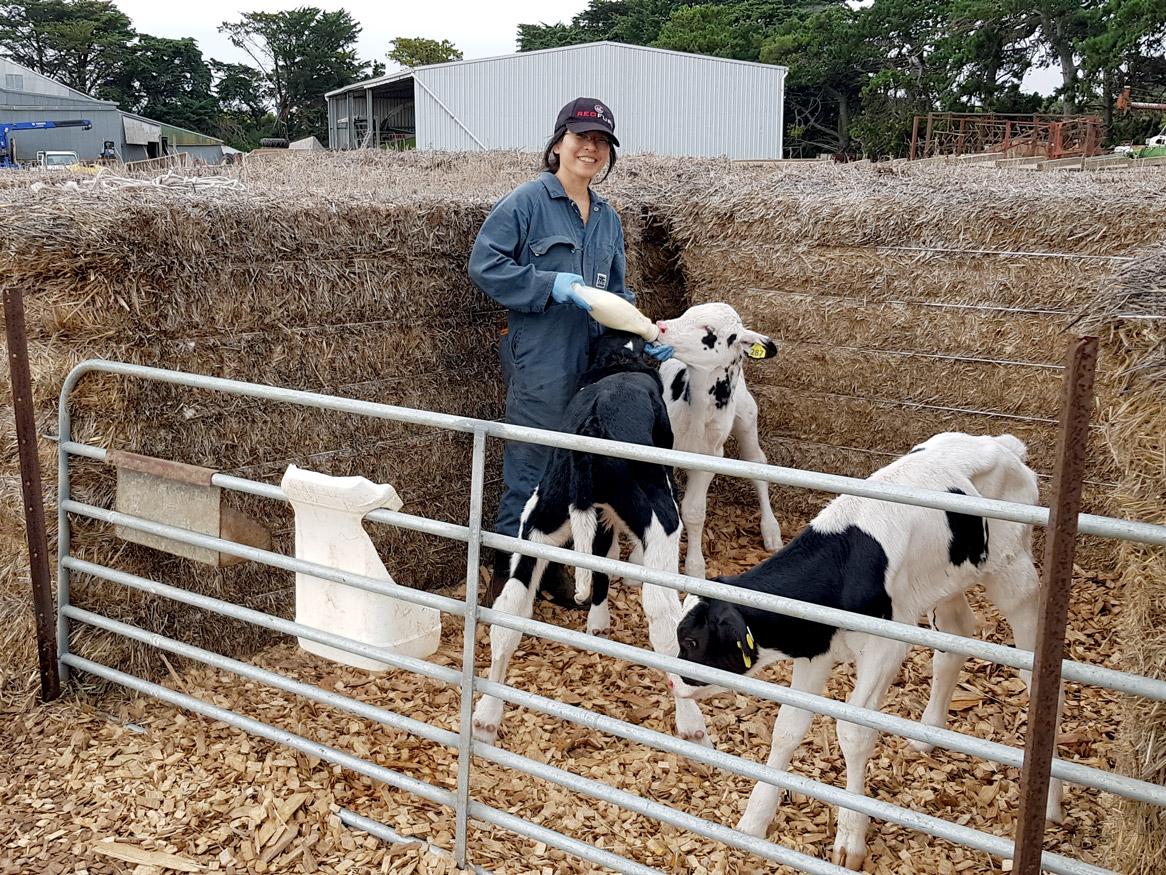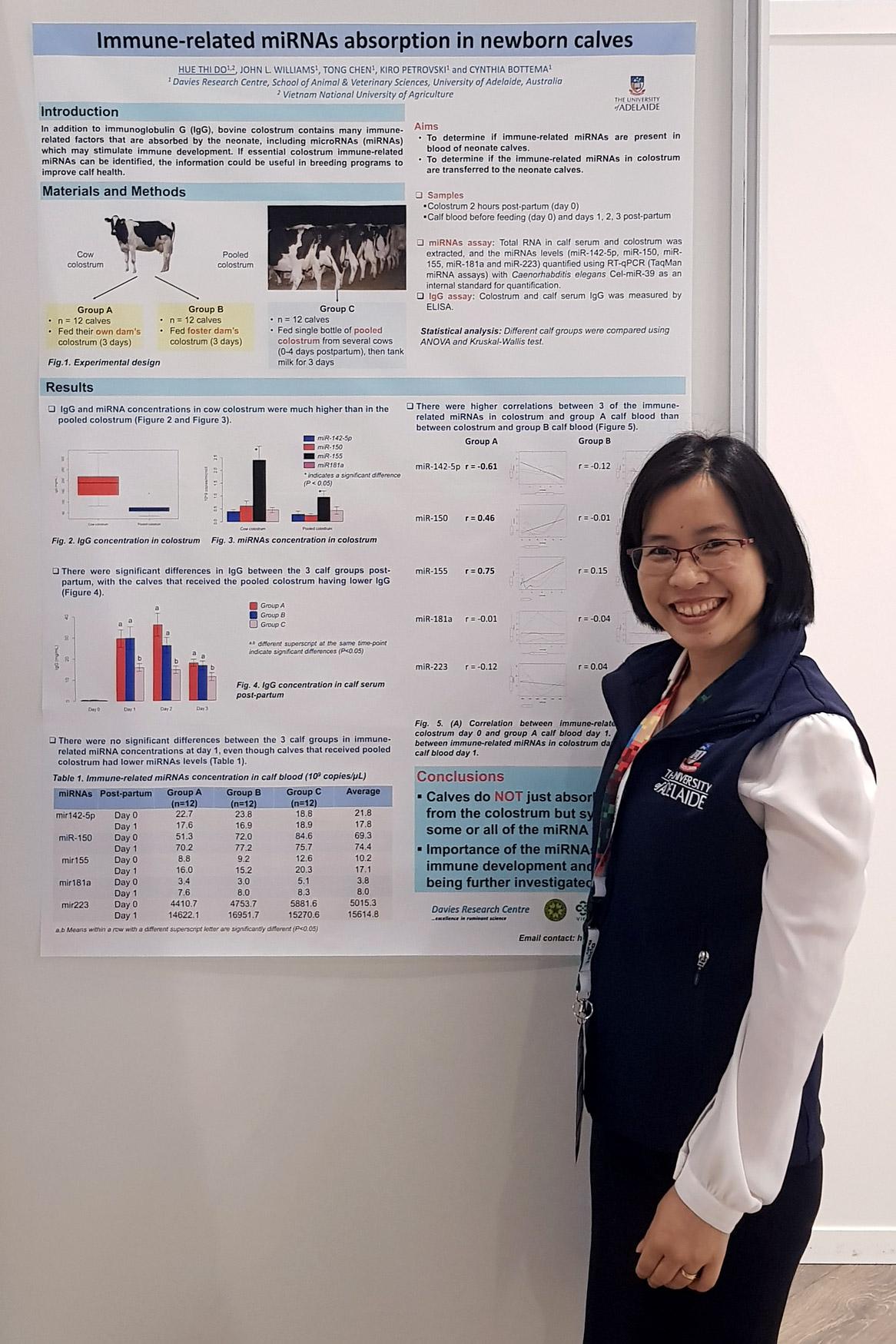How are the different immune components in colostrum absorbed by neonate calves?

PhD candidate Hue Thi Do
Case study: Understanding colostrum immunology.
Colostrum plays an important role in providing passive immunity to newborn mammals. This is especially true for neonate calves because the ruminant placenta prevents the transfer of immunoglobulins to the foetus during pregnancy.
However, surprisingly little is known about the absorption of other factors, besides immunoglobulins, in the colostrum by calves. This is the focus of the PhD research project of Hue Thi Do.
“Investigating different immune components in colostrum and their absorption by the neonate calf will help producers manage calf health and their production in the longer term,” Hue says.
“I have been enjoyed the research and learned many new techniques from my lab work and field trips associated with my colostrum project.”
Before becoming a PhD student at the University of Adelaide’s Roseworthy campus, Hue was working as a lecturer and researcher at the Department of Animal Breeding and Genetics, Faculty of Animal Science, Vietnam National University of Agriculture.
In her home country, she and her team investigated the biological characteristics, performance and product quality of different native chicken breeds, such as Dong Tao and Ho.
She also measured the semen quality and the effects of different semen diluents on hatching rate using artificial insemination on these chicken breeds. In addition,
Hue worked with the important livestock species in Vietnam, pigs, trying to improve their welfare and find molecular markers to improve their reproductive performance.
In 2017, Hue received a scholarship sponsored by the Vietnamese government to enrol at the University of Adelaide as a PhD candidate under the supervision of Associate Professor Cynthia Bottema, Professor John Williams and Associate Professor Kiro Petrovski.
“I would like to give my thanks and sincerest gratitude to my supervisors who have supported me with their knowledge, patience, motivation, and engagement throughout my study as well as my life as an international student,” Hue says.
“Research on bovine colostrum is very interesting and the most exciting field that I have ever studied because colostrum immune components are not only important to calf health but also contribute to improve human health as well.

“The importance of immunoglobulins (IgG) has been well studied, but other immune components such as immune-related miRNAs, immune cells, or microbiome need to be further investigated”.
Hue’s research has revealed that while some factors, such as IgG, must be transferred from the colostrum to the neonate calves, other factors such as microRNAs are synthesised by the calves themselves.
Her research also suggests that calves given the same colostrum will absorb the nutrients in that colostrum equally well.
However, the results hint that components in the colostrum from the calf’s own dam are better absorbed by the calf than if those components are from colostrum provided by a foster dam or pooled from multiple dams.
“If absorption varies between colostrum sources, then the management of dairy calves may be improved by allowing the neonate calf to suckle from their own dam for 12 – 24 hours,” Hue says.
“There is now a huge demand for milk and colostrum products in Vietnam, and the Vietnamese government is developing a national cattle herd, with an emphasis on dairy cattle and their products.
"All the techniques and knowledge from my colostrum studies here in Australia will certainly help me contribute to the new dairy cattle industry in Vietnam.”
Publications
- Predicting colostrum and calf blood components based on refractometry, Journal of Dairy Research
- Colostrum source and passive immunity transfer in dairy bull calves, Journal of Dairy Science
